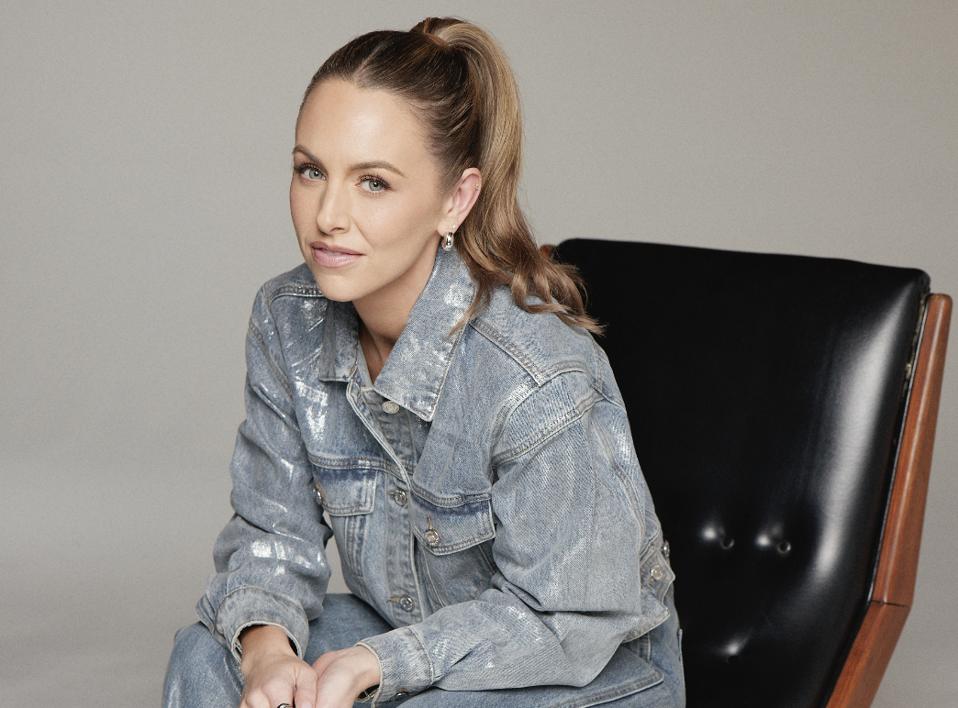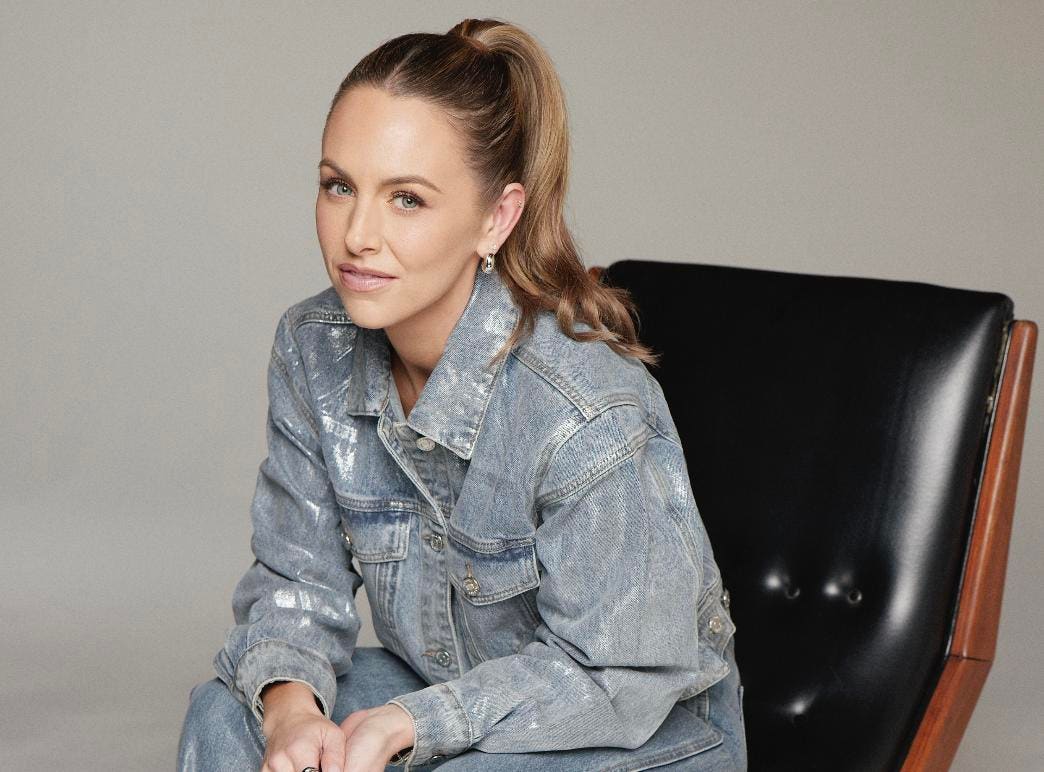
“The more you act in confidence, the easier it is—and the better you get at it.”
nuuds
Most entrepreneurs try to minimize embarrassment. Daryl-Ann Denner made it her business strategy—and built a nine figure fashion brand in just two years.
The former chemistry teacher turned influencer, now founder and CEO of nuuds, has built her empire on principles most of us spend our lives avoiding. She shared these six rules for entrepreneurial success during our conversation for The Failure Factor podcast.
Rule 1: “Embarrassment is the cost of entry”
Denner advocates for sharing your unfinished, imperfect product with the world as a starting point to iteration. In her case, she began posting outfit photos on her personal Instagram in 2015—during a time when the “influencer era” was in its infancy. The result? She lost half of her followers. “My husband’s friends were like, what is this girl doing?…This is weird,” she recalls.
Many people would consider the fifty percent attrition as a sign there wasn’t a market for her brand. But Denner interpreted it as a sign those who pressed “unfollow” simply weren’t her market. She pushed through the embarrassment, kept posting, and ultimately built an audience of 2.1 million.
This rule is about the public, social risk of starting something new and accepting that you’ll look amateur before you look professional. Every market opportunity has a window, and if you wait until all vulnerability has evaporated, someone else is likely to seize it. Embarrassment tolerance gave Denner a first-mover advantage. That same willingness to risk looking foolish became the training ground for her next lesson: building real confidence.
Rule 2: “Confidence is a trained muscle”
Denner has a similarly refreshing perspective on confidence. She doesn’t suggest standing in front of the mirror and reciting mantras or visualizing achieving your goal. Rather, she believes confidence is gained through experience. “I don’t think you wake up one day and you’re either confident or you’re not,” Denner explains. “You step into it rather than it just coming upon you. The more you act in it, the easier it is and the better you get at it.”
Consider this progression: the first time you pitch your business, you stumble through it. By the tenth pitch, you’ve refined your story. By the hundredth, you could do it in your sleep. That’s confidence through experience (and gaining competence), each repetition building evidence of capability.
In my work as a therapist and executive coach, I often share with my clients that the path to confidence in an area requires two main skills: the first is exposure or experience as Denner says. The second is self-compassion as we expose ourselves to the area in which we lack experience. Self-compassion means having realistic expectations for our performance as neophytes and allowing room for mistakes and knowledge gaps. When Denner launched nuuds with no fashion experience, she gave herself permission to learn publicly. Each mistake became data rather than a disaster. This dual approach—building competence while allowing imperfection—is what enabled her to invest her life savings despite being an industry outsider.
That said, confidence doesn’t cancel out fear—so Denner’s next rule is about acting even when fear lingers.
Rule 3: “Do it afraid”
So many of us wait until fear fades away before making a move—whether that’s leaving a job, pitching an idea, or pressing “post” on something that feels vulnerable. But fear rarely dissolves spontaneously.
Denner has struggled with anxiety since childhood, experiencing it so intensely during the postpartum period that it began to affect her relationships. “I don’t want to be short and irritable with the people I love most, but when I’m so consumed by anxious thoughts, that’s how I show up,” she admits.
This rule isn’t about conquering fear; it’s about not letting fear have veto power over opportunity. When nuuds was just an idea, Denner was terrified: “It felt like 2015 me again, putting myself out there of like, do you like it? Like, is it good?” She launched anyway.
The business case for doing it afraid? Risk and reward are correlated. The ventures that scare us most often have the highest potential return—because fear keeps most people out and reduces the competition.
Launching in fear also means exposing yourself to other people’s reactions—positive and negative. That’s where Denner’s philosophy on feedback comes in.
Rule 4: “Feedback is neutral”
When we’re building, it’s easy to become intoxicated by positive feedback or demoralized by negative. Denner’s entrepreneurial wisdom and maturity shine through in her interpretation of feedback: “I like to say that feedback is neutral,” Denner shares. “It’s not necessarily positive, because if you get in your head too much with the positive—honestly, that’s not good. And if you get too much in your head with the negative, that’s not good either.”
She’s lived this through extreme swings: “I’ve had moments where people love me, and moments where people hate me and it’s actually a mess and I’m being canceled.” Neither shifted her strategy—both were just information about who her audience was and wasn’t.
The key? Treat feedback like a scientist would: every response is data that prompts a question, not a conclusion. Customer complaint? “What specific problem are they trying to solve?” Press calling about shipping delays? “What systems need fixing?” Praise for a product? “What exactly resonated?” This curiosity-first approach strips feedback of its emotional charge and turns it into actionable intelligence.
When nuuds faced a distribution crisis and customers waited weeks for orders, she didn’t internalize it as failure. She analyzed it as operations data: hire ten more customer service reps, switch distribution centers, include free products as apology. “Feedback is neutral, it’s information, and what are we gonna do with it?” This allows entrepreneurs to pivot faster and survive brutal early stages. That same detachment from feedback also frees her from people-pleasing—a lesson that shapes her next rule.
Rule 5: “If you’re liked by everyone, you really stand for nothing”
Many founders chase universal appeal, but that can flatten brands into something forgettable. Denner did the opposite, instead chasing her ideal customer. “The people who buy in buy in hard, and they love it,” shares Denner—an understatement, considering the brand sold out 50,000 units in just seven minutes on launch day. “It’s not for everybody, and I’m not for everyone,” she adds, matter of factly.
Brands that try to appeal to everyone dilute their message until it resonates with no one. By accepting that nuuds wouldn’t be universal, Denner made room for bold choices: refusing “perfect size medium” fit models, choosing expensive stitching that actually flatters, and pricing based on quality, not competitors.
This polarization meant not everyone loved nuuds, but those who did became fiercely loyal. Even when an operational disaster struck, customers stayed—proving that the brand resonated with them deeply. Marketers call this “brand moat,” a protective barrier that prevents emotionally invested customers from switching brands to save money. That loyalty and conviction mirrors Denner’s own approach to entrepreneurship—because her final rule is all about betting on yourself.
Rule 6: “Bet on yourself”
Denner and her husband invested their life savings into nuuds—no VCs, no safety net. “If we’re going to bet on someone, we’re going to bet on ourselves,” she explains. Her conviction comes from witnessing her dad go through periods of debt and wealth: “You can make it once, you can make it again,” she insists.
Self-funding wasn’t just about maintaining control for Denner and her husband—it was about maintaining urgency. Every dollar mattered. This constraint bred innovation, like pre-announcing products to gauge demand before manufacturing.
When the website crashed minutes before launch, Denner had no investors to appease or board to blame. That total responsibility—terrifying as it was—meant she also had total authority to fix it.
For Denner, each of these rules isn’t just a business principle—it’s a growth principle, a reminder that entrepreneurship is as much personal evolution as it is professional success.
Denner’s vision: to create basics that truly fit women’s lives.
nuuds
What strikes me most about Denner’s approach is that she’s not selling a fantasy where confidence magically appears or where positive thinking prevents problems. She’s acknowledging what every successful person knows but rarely admits: growth requires discomfort, confidence comes from action not affirmation, and sometimes your worst fears come true—and you survive them.
“If you’re not failing to some extent, are you really growing?” she asks. “Are you taking risks or are you staying comfortable?”
Listen to my full conversation with Daryl-Ann Denner on The Failure Factor podcast, available on Apple and Spotify.
Megan Bruneau, M.A. Psych is a therapist, executive coach, and the founder of Off The Field Executive & Personal Coaching. She hosts The Failure Factor podcast featuring conversations with entrepreneurs about the setbacks that led to their success.
